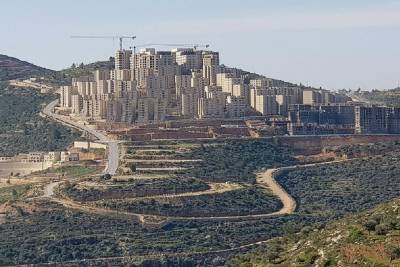Rawabi - Palestinian city in the West Bank with a Master plan
Shalom Europe - Ulrike Schleicher - In the West Bank of Jordan, for the last two years the city of Rawabi was being built as per a master plan for 40 000 future residents.
A German-Palestinian student is working on the construction site, and is very fascinated by the project.
Ramallah (dpa) - For a task you do not encounter often in life:
For a completely preplanned new city created within a legal framework, how will you establish public order, what services does the management offer and how great the municipal council will function?
With these questions Sadi Al Dari dealt. The 23-year-old German-Palestinian from Friedrichshafen studied Management Science at the
Zeppelin University and is currently doing an internship in the West Bank.
His workplace is a construction site on a hill not far from Ramallah:
Here within two years Rawabi was being built, a city designed according to a Master plan to ultimately accommodate 40 000 people. However, not only apartments are being built, but a whole infrastructure: with schools, a mosque, a church, a giant shopping and business center, hotels, a hospital, movie theaters and offices.
By the end of the year the first inhabitants will start moving in the city, and by then the shopping center and the first school building will be ready.
The dream and idea for the project came from gigantic Bashar Masri, a Palestinian billionaire with an American passport. The 52-year-old, not only wanted to combat the acute housing shortage in the West Bank, but also to establish the base for a future Palestinian state. Funded with approximately 770 million Euros, with a big chunk coming from Qatar as well as other investors that Masri met some of them in Germany, he launched his project.
Along with the apartment buildings there is also a future city hall, which will be run by an elected mayor. Until then, it takes a while, but nevertheless a team is already busy right now to establish law and order in the city.
"This is pioneering work," says Al-Dari "The infrastructure here is currently funded by the private sector and later will be handed over to the public sector, which do not exist yet.”
The legal basis for the team's first legislation will emerge from the Palestinian municipality’s laws. This sounds simple, but Al-Dari often feels like a "hectic Kafkaesque process," as he says. The reason being a big mess due to many various laws, some even dates back to the British Mandate, and then after due to Jordanian influences, Palestinian and of course- because of occupation - have the Israeli laws. The latter can destroy major re-making.
"The legal autonomy is often only available on paper," according to al-Dari experience. For example, in the water supply issue, Israel has the monopoly in the occupied territories where it is often arbitrary. On the other hand, with regard to the construction of roads, Israel did not approve the access road to the city yet. Problems may arise as well with the waste disposal treatment needed for the future city, since Rawabi is been built to be a green city.
But the capacity of landfills in the area is not enough too, and so far, the military administration delays the construction of new landfills; says the aspiring management scientists. "Hence applying the whole Concept comes to naught.”
Otherwise, the municipality team sets rules for maintaining peace, issue business licenses, parking and much more based on previously existing municipal ordinances. "We do not reinvent the wheel again.”Still, some of Rawabi’s features will be different than in other Palestinian cities, such as there will be no water tanks on the roofs, and hardly any traffic on the neighborhoodsonly roads. Donkeys, horses or sheep will never be seen on roads or uncoordinated street markets also.
All of the above will be reflected in the local law to be issued, says Al-Dari. And despite the many odds there will be room for many new ideas:
such as adopting the so-called e-government transactions, in which a citizen enjoys all administrative services via the Internet to meet his many needs.
The 23-year-old is fascinated by his work. "It is unique. And the coexistence law is indeed simple. "Still the opposite is also true”.
To view original article, Click Here.



